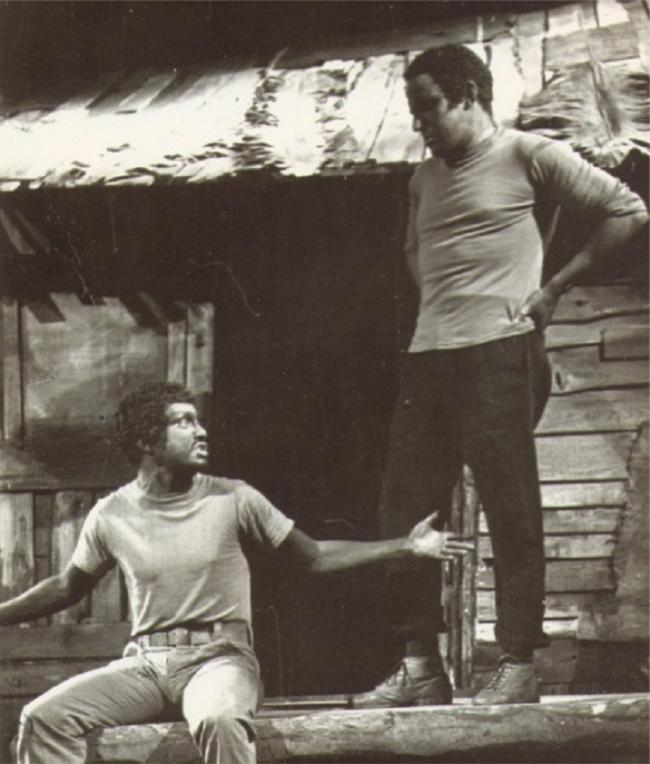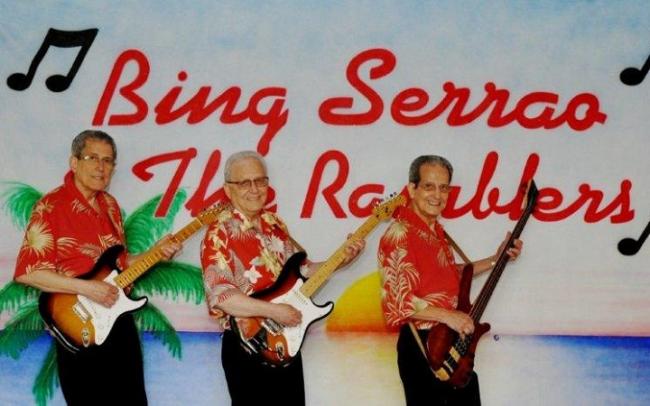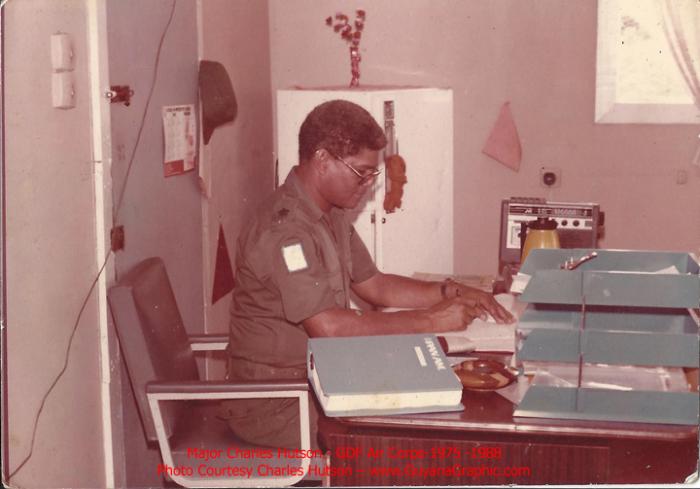Background to the Opera – ‘The Sugar Reapers’
The world premiere of the ‘The Sugar Reapers’ took place in Leipzig Opera House on 11th December 1966. It had productions in Tartu Opera House, Estonia, U.S.S.R. (1969) and Odessa Opera House, U.S.S.R. (1973). The Leipzig production was broadcast by East German Radio in 1968; this radio version was broadcast by BBC Radio 3 in 1976 with added English narration and subsequently repeated twice.
After the great historical operas ‘Wat Tyler’ and ‘Men of Blackmoor’ Alan Bush has turned, in this opera, to a subject of the present day, one of both local and general significance, the struggle of the people of Guyana against the oppression of the British colonial regime and those who serve its interest. The historical background is the victory of the People’s Progressive Party in the year 1953. In the struggles of this decisive year in Guyana’s history a story of true love between the Indian girl, Sumintra, and the African boy, Johnny Lucas develops, is tested and stands the test.
In preparing for the opera, Alan Bush made intensive studies of the music of the country. He found exciting material in the folk music of Guyana, among the African and Indian populations. He succeeded in the convincing dramatic use of exciting Negro rhythms, most amply demonstrated by his use of the Kwe-Kwe songs and dances, and of exotic and colourful Indian melodies, both of which he incorporated into his personal musical language. His work is a choral opera. Out of the big choral scenes with their life, movement and climaxes, which carry the audience with them, emerge the events of the personal story. The people to whom Sumintra and Johnny belong are the heroes of this opera. The colourful, joyous songs of the people express that fundamental optimistic outlook, which convinces the hearer that these men and women will be victorious.
Alan Bush on his opera, ‘The Sugar Reapers’, 1966 – Alan Bush writes:
“On November 18th, 1956, my second opera, Men of Blackmoor, received its first performance in the German National Theatre, Weimer. The Director of the Theatre, Karl Kayser, at the reception after the performance expressed the wish that I should compose in due course a third opera, the first performance of which he would hope to stage in his theatre, an invitation which I readily accepted.
Indian dancer
I thereupon started to consider what the subject should be. I found, after a good deal of thought, exactly what I wanted in the fight for independence of the people of the colony, then known as British Guiana, which had reached a high point in 1953, only three years before. In August 1959, I made a journey, with my daughter, Rachel O’Higgins, to Guyana. We were made most welcome by the governing party, the People’s Progressive Party of British Guiana, who had been returned to power in the election of 1957. We were provided with a car and driver, and travelled almost all over the country by road, by motor-launch along rivers and by air. We talked to all kinds of people and recorded a great many of their songs. We witnessed many of the peculiar hardships of their lives, such as the gravely insufficient water-supply on the sugar plantations, the incessant indebtedness of the sugar-workers to the local shop-keepers, owing to periods of short-time working, and the appalling housing conditions, some of the people being still obliged to live in the so-called ‘ranges’, which had been built for the slave-workers of the 19th and early 19th centuries. These social disabilities are all shown in the opera as motivating forces in the struggle for independence.
Furthermore, the opera has as one of its themes the overcoming of racial hostility between Africans and Indians, which the People’s Progressive Party did so much to achieve. From the many songs which we recorded, including the African Song of Emancipation from the year 1842 when slavery was abolished, the classic African padding song ‘Itanami’, the African betrothal songs, known as Que-Que songs, and the Indian folk and religious songs, many have been chosen, and on the basis of their melodies and rhythms much of the music the opera has been developed.”
Characters
Johnny Lucas, African sugar worker –
Bass Joseph, his younger brother, a clerk in the village store – Tenor
Panasar, Indian sugar worker – Tenor Ganesh Maraj, Indian diver on plantation – Bass-baritone Mr. R. Souza, keeper of local rum shop – Tenor
Local Police Sergeant, African – Bass
Police Officer from Georgetown – Baritone Aaron, ten-year-old brother to Johnny Lucas – Non-singing part
Sumintra, Panasar’s daughter – Soprano
Mrs. Lucas, Johnny’s mother – Mezzo-soprano
Ella, African village girl – Soprano
African village girl – Contralto Sugar workers, villagers, policemen, girls, young men
Synopsis
The story of the opera is set in British Guyana in 1953, where the local inhabitants have their first election and the Popular Party wins a majority of the seats. It takes place in a village near Georgetown, British Guiana and a street outside Georgetown prison.
Act 1
Scene 1
A village near Georgetown, showing two trash houses, the homes of Mrs. Lucas and Panasar respectively. Young Joseph Lucas, African clerk in the local store, tells his friends how he means to leave and get rich quick in the city. He displays a gold wrist-watch which he has acquired – somehow. The sugar plantation workers have been put on short time. Among them is the Indian, Panasar, and when Maraj, the plantation overseer, also an Indian, makes a marriage proposal for his daughter, Sumintra, Panasar hopes to gain favour by agreeing. Sumintra, who is in love with Johnny Lucas, Joseph’s brother, indignantly refuses her father’s choice.
Joseph Lucas and friends
Scene 2
The same, next day. Joseph is being urged to go to work by his mother, then by his elder brother, Johnny, whose authority he resents. Johnny is the leader of the Popular Party in his village. There is a love scene between Johnny and Sumintra in which his hopes to change life for the better in Guyana are expressed. The villagers come in on their way to a meeting for the coming elections. Maraj derides their hopes and sneers at Johnny, who is supported by the local people.
Scene 3
The village rum shop on election night. Maraj, Panasar and the others sit drinking as election results come through on the radio loudspeaker. Maraj accuses Panasar of breaking his word over Sumintra’s marriage to himself and leaves the scene in anger. Johnny and others return from the voting, the final results are announced and they realise that a majority has been gained. The jubilant villagers now urge Johnny to make his day perfect and ask for Sumintra as his wife, to which Panasar at last agrees. A Que-Que or series of African betrothal songs and dances are given in traditional style.
Act 2
Five months later emergency rule has been instituted in British Guyana and a warship lies at anchor outside Georgetown.
Scene 1
Inside the village police station. Mr. Souza, owner of the rum shop, discusses the changed situation with an African police sergeant. Maraj brings in Joseph, who is questioned for evidence against Johnny. The threat of imprisonment for his stolen watch is used to force a signed statement from him that Johnny was present at a meeting, this now being illegal.
Scene 2
The village as in Scenes 1 and 2, now decorated for the wedding of Johnny and Sumintra, Indian style. The ceremony is slow in starting, Joseph is worried and anxious. Suddenly Georgetown police come in with a warrant for Johnny’s arrest. He is seized and taken out, and the guests leave in disorder. Sumintra is upbraided by Panasar for the disgrace of a broken marriage; she is left alone with Joseph, who in remorse confesses that he acted as police informer. Sumintra, understanding the situation fully, does not reproach him.
Scene 3
Street outside the gates of Georgetown prison. Villagers including Mrs. Lucas, Sumintra and Joseph, wait for the prisoners, among them Johnny, who are marched in by the police singing their freedom song. They are thrust hastily into the prison. The villagers surge up to the gate in a chorus of encouragement and support, then leave for the village. Sumintra, who has remained at the gate, is accosted by Maraj but protected by Joseph. Maraj is finally driven off as they begin the long trudge back to the village, where they will wait faithfully for Johnny’s release.
Opinions and Commentaries on ‘The Sugar Reapers’
The Times, 17 December 1966
A review of the premiere of ‘The Sugar Reapers’ in Leipzig, on December 11th, 1966.
Ganesh Maraj and Sumintra
“In the beautiful new opera house, of which Leipzig is rightly so proud, Alan Bush’s third opera, The Sugar Reapers (Guyana Johnny in the German version) has just had a successful first performance. Immense skill and care had been spent on Fritz Bennewitz’s production, which was direct, realist and well suited to the romantic, unsophisticated feeling of the opera as a whole.
Against a background of unrest among the sugar workers, a simple story of true love and treacherous family betrayal is brought to a climax, in which the police burst upon the marriage ceremonies of Johnny, who has become a leader of his people, and his Indian bride. The story calls for colour and vitality, qualities that are strongly evident in Bush’s music, through two principal means of impact. First, the splendidly composed choral ensembles, big in scope and vigorous in rhythm, convey the whole feeling of the work in an uninhibited way. Secondly, some highly singable solo arias enable the principal characters to engage the sympathy of the audience in a manner that is as welcome as it is uncommon in modern opera. The effectiveness of Bush’s writing, moreover, whether for soloists, chorus or orchestra, is a powerful factor in the success of the opera. Although difficult, the music is always rewarding, and never ungrateful to the performers, a rare quality these days.
Among a cast whose level of singing and acting was high, one may specially mention the two men, Juraj Hrubant and Edgar Waehlte – fine artists both of them. Impressive also was the fiery and confident conducting of Rolf Reuter…
If Bush’s style does not seem to have undergone any radical change in this opera, his use of Indian and African folk music has given the score a new freshness and flexibility. This opera is no less serious than his previous ones, but more genial and approachable, and more varied in colour and texture: the composer has written nothing finer than the choral dances at the end of Act I, and nothing more beautiful than the opening chorus and the quiet introduction to the second scene of Act II, where the cor anglais solos were beautifully played by one of the two women in the orchestra.
This whole production, in fact, brings the greatest credit to the Leipzig opera house, and to those responsible for its policy and performances: one can only hope that London will soon see a production of its own as good as this Leipzig one.”
Stage & Television Today, 29 December 1966 The reviewer, O.T. writes:
Alan Bush’s third full-length opera, ‘The Sugar Reapers’, commissioned by Karl Kayser, manager of the Leipzig Opera, had its world premiere at the Opera House there…Bush collected local colour and absorbed musical influences in the former British colony of Guiana, where the action is laid and many of his melodies have their roots in African, South-American or Indian folklaw, Nancy Bush’s libretto, in six scenes, concentrates on the workers’ struggle and Johnny’s fight against out-dated superstitions. With lively jazz rhythms, sambas and Indian dances, Bush enlivens a score that the Gewandhaus Orchestra…played with their accustomed authority.”
© Rachel O’Higgins, Alan Bush Music Trust, 2001
http://www.alanbushtrust.org.uk/music/operas/reapers.asp?room=Music






